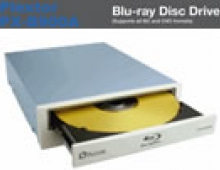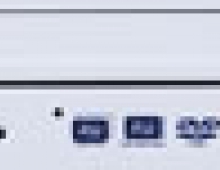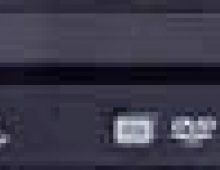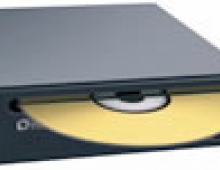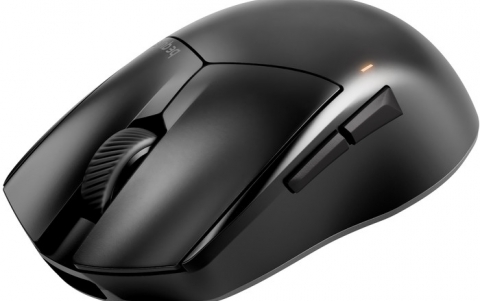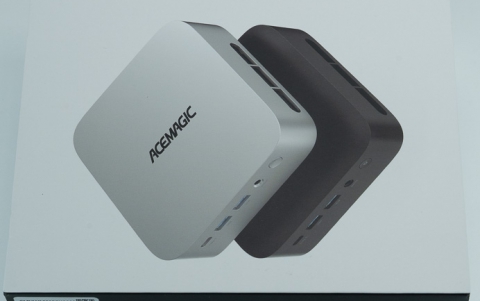PleXWriter PX-S88TU Vs TEAC CD-RW280PU
6. CDR Tests
CDR Tests
Both drives support 8x (CLV) writing with USB 2.0 interface. When connected to USB 1.1 the writing speed drops at 4x (CLV). In addition, both drives support anti-buffer underrun technologies - TEAC supports "JustLink", and PleXWriter "BURN-Proof". We tested both drives with Nero v5.5.2.4, CloneCD v3.0.8.2 and Padus DJ v3.50.799 software. For the CDR tests we used: Creation 74min (12x), Taiyo Yuden 74 & 80min (24x), Mitsui 74min (24 & 16x) and Verbatim/TDK 74min HS-RW media.
- CD-R Tests
We created a "DataCD" job with data slightly higher than 74mins (74:03:65). We burned the same job with both drives, using the same media:

The TEAC CD-RW280PU was faster than PleXWriter PX-S88TU with all tested media. The TEAC needs 598min to finish the task, while the PleXWriter needs 13 more secs. It seems that PleXWriter OPC lasts longer, but as we will see it gives better quality produced CDs, mostly with lower quality media. The CPU Usage is very low for both recorders! No more 100% CPU Usage, when using USB 2.0 recorders.
- 80min CDs
Following the same procedure as in the previous test, we created a DataCD with data lower than 80min (79:49:50). The TEAC drive doesn't support overburning and we used the same media for all burns. The TEAC CD-RW280PU is faster, with only 5secs ahead:

- Writing Quality Tests
We used low quality media written at 8x, with both drives. The results are posted in the following table:
* Creation 74min 12x
Creation 74min - 12x - serial: 1B-11401-15:49
ATIP: 97m 27s 19f
Disc Manufacturer: Plasmon Data Systems, Ltd.
Assumed Dye type: Phthalocyanine (Type 9)
Media type: CD-Recordable
Nominal Capacity: 654.49MB (74m 30s 00f / LBA: 335100)
Disc subtype: Medium Type B, low Beta category (B-)
Target writing power: 5
|
8x writing speed
(AudioCD) |
|||
|
Model |
C1 |
Average Burning Time (secs) |
|
|
Max |
Average |
||
|
PleXWriter PX-S88TU |
39 |
6,7 |
623 |
|
TEAC CD-RW280PU |
47 |
7,5 |
591 |
The PleXWriter produced CDs of better quality, when using low quality media from "Creation". The drive produced 6.7, while the TEAC has 7.5 C1 error rate. The TEAC however is 32secs faster than the PleXWriter with the specific media.
When using high quality media (such as Taiyo Yuden 80min 24x), both drives produced CDs of equal quality (0.2 C1 average error rate). The following graph comes from the Creation 74min 12x media:
- Overburning Tests:
The TEAC CD-RW280PU doesn't support overburning and as for PleXWriter PX-S88TU
it seems to go only up to 89minutes.
- CD-Text Results:
We created several AudioCDs with CD-Text enabled. Both drives can write/read
CD-Text without any problems.
- CloneCD Tests:
CloneCD v3.0.8.2 reports that the TEAC drive supports only SAO-RAW writing mode, while the PleXWriter supports only RAW-DAO. CloneCD recognizes that both drives have anti-buffer underrun protection. The TEAC supports simulation with "JustLink" enabled, while the PleXWriter doesn't. According to our tests, TEAC can backup only SD1, LaserLock1/2 and PleXWriter SafeDisc 1, LaserLock 1/2 and SecuROM 2 protected CDs.

- SD2 Support:
For the SD2 tests we used the "No One Lives For Ever", "Emperor
Battle for Dune" and "Max Payne" CD titles. We used both drives
as readers/writers. The produced backups didn't play in the same or other drives.
Therefore both drives cannot produce SD2 working backups.
- 8cm mini CDs:
Both drives support 8cm CDs. We are not so sure if business cards are supported.
With 8cm CDs the PlexWriter lowers its writing speed to 4x and reading speed
down to 18x (CAV).
- Buffer Underrun tests:
Both drives support anti-buffer underrun protection. The PleXWriter PX-S88TU
has got the "BURN-Proof" certificate from the BURN-Proof center, which
ensures that the drive will produce the highest quality CDs, when BURN-Proof
is activated. The TEAC CD-RW280PU supports "JustLink" anti-buffer
underrun technology, which eliminates coasters from buffer underruns. Both drives
worked without any problems when buffer underrun was attempted from our side.
When you press ctrl+alt+del the drive will start blinking and when you un-freeze
the PC writing is resumed :-)


